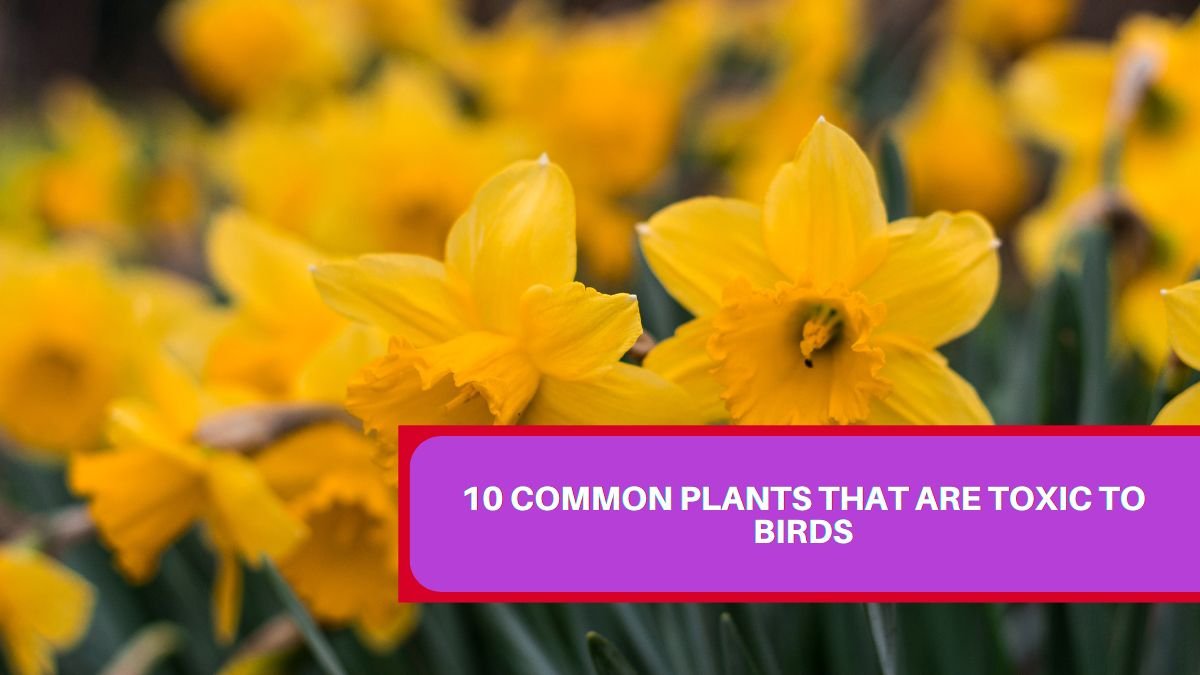If you have pet birds like parrots, it’s really important to know which plants are safe for them. Many common houseplants can be harmful or even deadly to birds. The toxicity of a plant can depend on its type, the size of your bird, and how much it eats. Signs that a bird may have eaten something toxic include stomach issues and vomiting, which can quickly become serious. Always act fast—if you think your bird has eaten something harmful, call a vet or a poison hotline right away. The best way to keep your feathered friend safe is to learn about plants that are toxic to birds.
1. Amaryllis
Amaryllis plants look beautiful but can be very dangerous for birds. Every part of this plant, especially the bulb, is toxic. If a bird eats it, it might vomit, have diarrhea, or lose its appetite. In severe cases, it can be very harmful.
2. Daffodil
Daffodils are cheerful spring flowers but can harm birds. They contain a chemical called lycorine that can cause serious stomach problems and even seizures if eaten. It’s best to keep these flowers out of reach.
3. Holly
Holly is often used for decorations during the holidays, but its leaves and berries are poisonous to birds. Even though they may seem like a tasty treat, they can make your pet very sick. Consider using fake holly instead.
4. Ivy
Ivy plants are popular for home decor, but many types, especially English ivy, are dangerous for birds. Eating ivy can lead to vomiting, stomach pain, and excessive drooling. It’s better to avoid having ivy where birds can get to it.
5. Lilies
Lilies are loved for their beauty but can be harmful to birds. They can irritate a bird’s mouth and cause serious stomach issues. Remove all lilies, including peace lilies, from areas where your birds live.
6. Mistletoe
Mistletoe is a common holiday plant, but it can be dangerous for birds. Eating mistletoe can cause vomiting, diarrhea, and weakness. Make sure to keep it away from your pets.
7. Morning Glory
Morning glory flowers are pretty, but their seeds can be toxic to birds. They contain chemicals similar to LSD, which can be very harmful if ingested. Be careful when planting these flowers.
8. Philodendron
Philodendron plants are popular indoor plants, but they are not safe for birds. Every part of this plant is toxic and can cause severe mouth irritation and other health issues. It’s best to keep these plants out of your home if you have birds.
9. Poinsettia
Poinsettias are often used in holiday decorations, but they are poisonous to birds. Eating poinsettia can lead to serious stomach problems and skin irritation. Consider other decorations that are safe for pets.
10. Shamrock
Shamrock plants may seem lucky, but they are highly toxic to birds. They can cause symptoms like tremors and excessive drooling. If you want a lucky plant, choose one that is safe for your birds.
If you think your bird has eaten any of these toxic plants, don’t wait—call your vet right away. Always check with your veterinarian for health questions, as they know your pet’s health history and can give the best advice. Keeping your home safe means knowing which plants are toxic to birds, ensuring your pet bird stays healthy and happy.
FAQ’s
What are the signs that my bird has eaten a toxic plant?
Signs include vomiting, diarrhea, excessive drooling, and lack of appetite. If you notice any of these symptoms, contact your veterinarian immediately.
Can I have any houseplants if I own a bird?
Yes, you can have houseplants, but make sure to choose bird-safe varieties. Always research plants before bringing them into your home.
What should I do if my bird eats a toxic plant?
Call your veterinarian or a poison control hotline right away for advice on how to help your bird. Quick action can be critical for their health.

